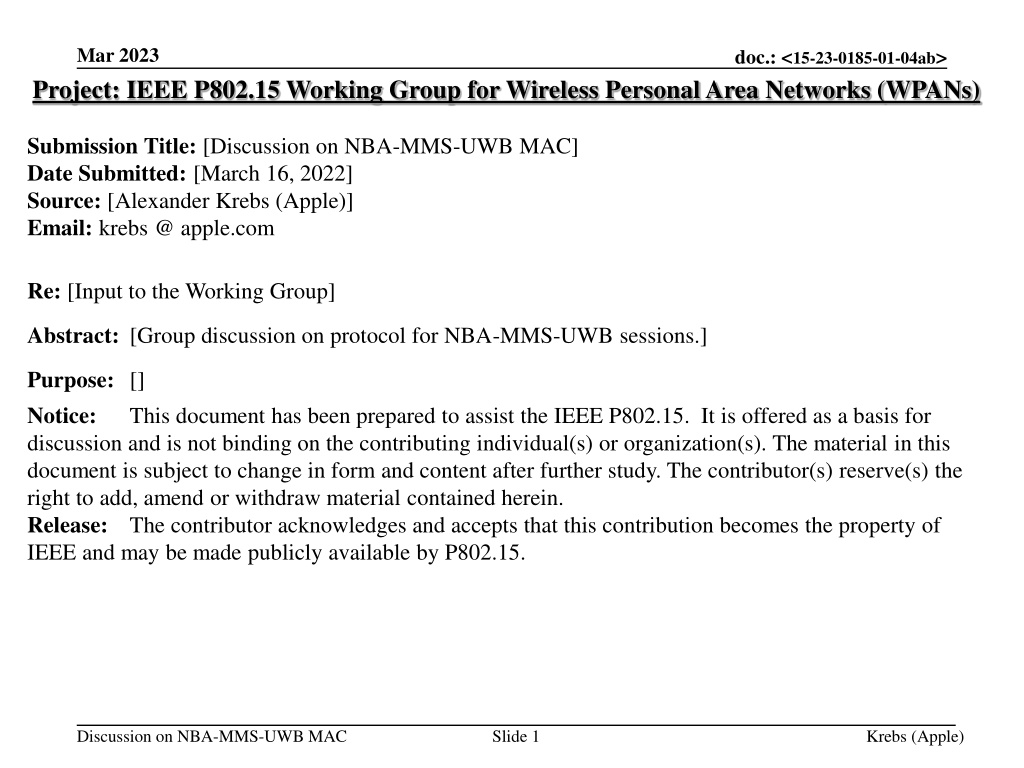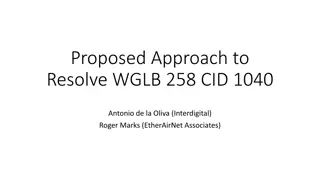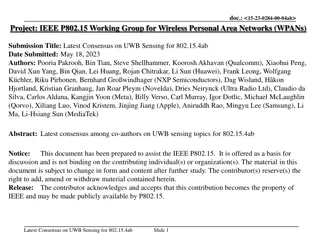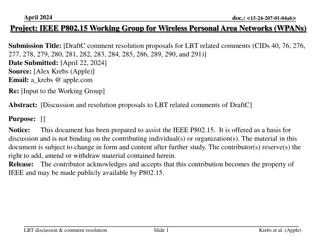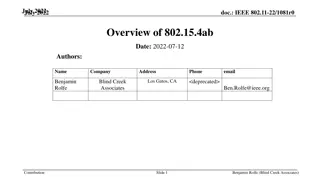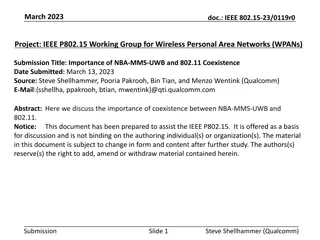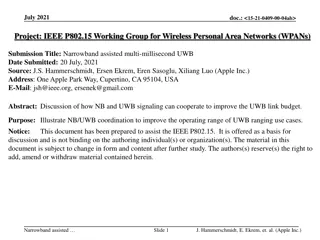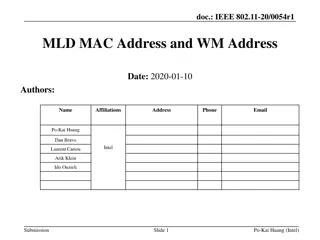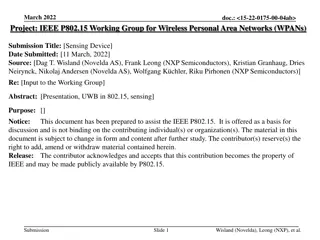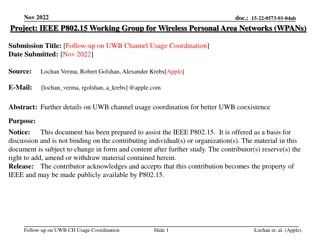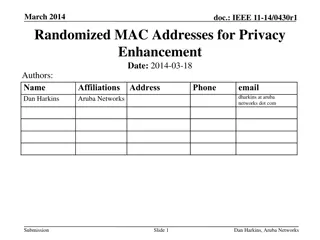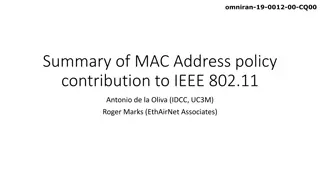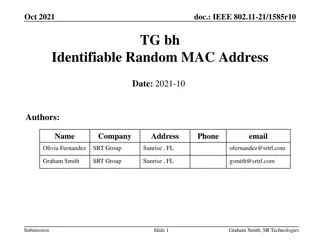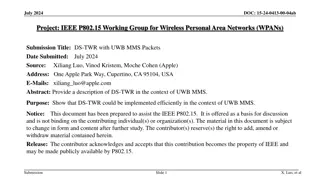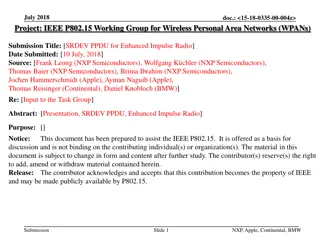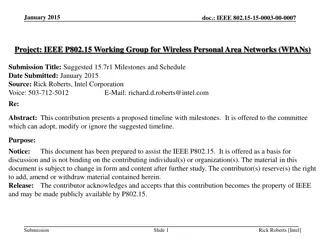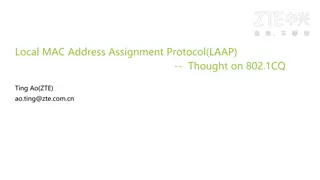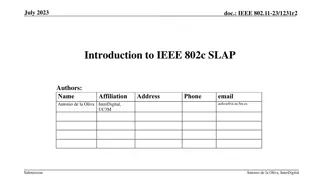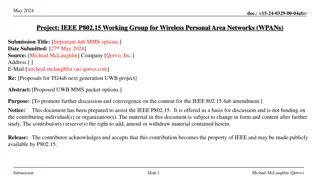Discussion on NBA-MMS-UWB MAC in IEEE P802.15 Working Group
This document presents a group discussion on the protocol for NBA-MMS-UWB sessions submitted to the IEEE P802.15 Working Group by Alexander Krebs from Apple. It covers objectives such as interference mitigation, improved link budget, and enhanced native discovery mechanisms for Wireless Personal Area Networks (WPANs). The proposed solution aims to enhance session startup and discussion related to NBA-MMS-UWB MAC, with topics including safeguards for high throughput data use cases, backward compatibility, and infrastructure synchronization mechanisms.
Download Presentation

Please find below an Image/Link to download the presentation.
The content on the website is provided AS IS for your information and personal use only. It may not be sold, licensed, or shared on other websites without obtaining consent from the author. Download presentation by click this link. If you encounter any issues during the download, it is possible that the publisher has removed the file from their server.
E N D
Presentation Transcript
Mar 2023 doc.: <15-23-0185-01-04ab> Project: IEEE P802.15 Working Group for Wireless Personal Area Networks (WPANs) Submission Title: [Discussion on NBA-MMS-UWB MAC] Date Submitted: [March 16, 2022] Source: [Alexander Krebs (Apple)] Email: krebs @ apple.com Re: [Input to the Working Group] Abstract: [Group discussion on protocol for NBA-MMS-UWB sessions.] Purpose: [] Notice: discussion and is not binding on the contributing individual(s) or organization(s). The material in this document is subject to change in form and content after further study. The contributor(s) reserve(s) the right to add, amend or withdraw material contained herein. Release: The contributor acknowledges and accepts that this contribution becomes the property of IEEE and may be made publicly available by P802.15. This document has been prepared to assist the IEEE P802.15. It is offered as a basis for Discussion on NBA-MMS-UWB MAC Slide 1 Krebs (Apple)
Mar 2023 doc.: <15-23-0185-01-04ab> PAR Objective Safeguards so that the high throughput data use cases will not cause significant disruption to low duty-cycle ranging use cases Interference mitigation techniques to support higher density and higher traffic use cases Other coexistence improvement Backward compatibility with enhanced ranging capable devices (ERDEVs) Improved link budget and/or reduced air-time Additional channels and operating frequencies Improvements to accuracy / precision / reliability and interoperability for high-integrity ranging Reduced complexity and power consumption Hybrid operation with narrowband signaling to assist UWB Enhanced native discovery and connection setup mechanisms Sensing capabilities to support presence detection and environment mapping Low-power low-latency streaming Higher data-rate streaming allowing at least 50 Mbit/s of throughput Support for peer-to-peer, peer-to-multi-peer, and station-to- infrastructure protocols Infrastructure synchronization mechanisms Proposed Solution (how addressed) Improved session startup and discussion Discussion on NBA-MMS-UWB MAC Slide 2 Krebs (Apple)
Mar 2023 doc.: <15-23-0185-01-04ab> Agenda Additional NB-MMS discovery modes (30min) MMS MAC TFD open items (30min) Discussion on NBA-MMS-UWB MAC Slide 3 Krebs (Apple)
Mar 2023 doc.: <15-23-0185-01-04ab> Coordination vs Initialization/Discovery Coordination (Mingyu et. al, DCN 67, Baltimore) Devices broadcast own scheduling information in AP packets Devices scan for AP packets to learn about unoccupied network resources Discovery/Initialization (Alex et. al, DCN 33, Baltimore) Peer-to-peer handshake between Initiator and responder for MMS configuration Triggers start of MMS ranging upon success Discussion Initialization carries privacy sensitive information that needs to be protected Coordination must not broadcast privacy sensitive information Proposal/Conclusion: keep as separate methods, merge would simplify, but limit functionality Add coordination to MMS MAC TFD document with tbd scope Discussion on NBA-MMS-UWB MAC Slide 4 Krebs (Apple)
Mar 2023 doc.: <15-23-0185-01-04ab> Coordination after Handshake Relevant for non-triggered use cases (e.g., background activity) Coordination AP information is only relevant in the moment of handshake Scanning for AP information ahead of handshake is energy draining Initiator shall RX for ADV-RESP after ADV-POLL (DCN 381) Initiator may TX SOR after ADV-RESP (DCN 381) Means: Initiator may decide to not start ranging after discovery of responder, scan for coordination APs for arbitrary duration, then TX ADV-POLL again to handshake Discovery Channel(s) time offset ADV POLL ADV POLL ADV POLL SOR Initiator Responder SCAN SCAN ADV RESP time Ranging Channel(s) PO LL REP ORT Initiator UWB RANGING Responder RE SP REP ORT Discussion on NBA-MMS-UWB MAC Slide 5 Krebs (Apple)
Mar 2023 doc.: <15-23-0185-01-04ab> Coordination after Handshake SO R Improvement (Mingyu et. al, DCN 150, Atlanta) + 4ab Brainstorming Initiator advertising (non-trigger based) can save power by deferring scanning for coordination AP by using ADV-CONF instead of SOR ADV-CONF defers SOR through time offset announcement Initiator scans for AP information, coordinates, then sends SOR at announced Pro: Responder knows exact time offset to SOR Discussion on NBA-MMS-UWB MAC Slide 6 Krebs (Apple)
Mar 2023 doc.: <15-23-0185-01-04ab> Coordination after Handshake Question/Discussion Original discovery scheme already allows scanning for coordination APs after discovery Improvement by deferred SOR is that Responder knows exactly for how long initiator will be scanning for APs Faster session start, no random scanning from Responder necessary Multiple packet types with varying functionality SOR/ADV-CONF add implementation complexity and standard variants Group preference? Discussion on NBA-MMS-UWB MAC Slide 7 Krebs (Apple)
Mar 2023 doc.: <15-23-0185-01-04ab> Summary Discovery/Initialization Encouraging feedback from the discussion to further work on deferred start of ranging Intent to work on merging text proposals MMS MAC TFD Expressed interest on extending the UWB only MMS by either OOB, or in-band UWB MAC data protocol Proposal to simplify NB channel switching frequency to per-block only, and drop per- slot , tabled for further discussion Discussion on ETSI specification changes regarding CCA bandwidth in ETSI EN 303 687 Intention is to assure 4ab specification compliance independent of outcome of ongoing regulatory discussions Discussion on NBA-MMS-UWB MAC Slide 8 Krebs (Apple)
